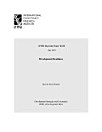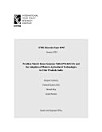Persistence of individual and social preferences in rural settings
Jul 2025 · IFPRI Discussion Papers Book 2345 · Intl Food Policy Res Inst
Ebook
40
Pages
family_home
Eligible
info
reportRatings and reviews aren’t verified Learn More
About this ebook
Preferences play a key role in decision-making and are generally assumed as time-invariant in economic modeling despite the mixed empirical evidence. We examine the stability of individual and social preferences in rural settings using the COVID-19 pandemic as a major global shock. We employ a unique longitudinal dataset comprising 1,262 smallholder households, based on interviews with household heads conducted across four survey waves between 2019 and 2022. We find a temporal, two-year shift in risk tolerance, while interpersonal trust and generosity perceptions show a sustained deterioration over three years. We explore possible variations by household characteristics and the degree of exposure to the virus, self-confinement, and extreme weather events.
Rate this ebook
Tell us what you think.
Reading information
Smartphones and tablets
Install the Google Play Books app for Android and iPad/iPhone. It syncs automatically with your account and allows you to read online or offline wherever you are.
Laptops and computers
You can listen to audiobooks purchased on Google Play using your computer's web browser.
eReaders and other devices
To read on e-ink devices like Kobo eReaders, you'll need to download a file and transfer it to your device. Follow the detailed Help Center instructions to transfer the files to supported eReaders.







